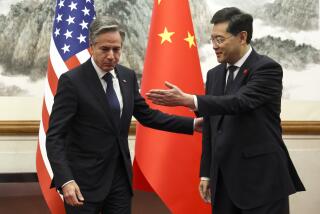China Shrugs Off Furor Over Journalists’ Visas
- Share via
BEIJING — The Foreign Ministry on Tuesday dismissed the flap over China’s withdrawal of visas for three journalists scheduled to travel with President Clinton on his visit here this week, saying that it had acted according to its regulations governing foreign media.
Ministry spokesman Tang Guoqiang declined to specify what rules the three representatives of Radio Free Asia might have violated to warrant the revocation, made just days before the president’s departure. “We welcome correspondents from all over the world to cover the coming visit by President Clinton,” Tang said. “Approval is based on the regulations for foreign correspondents in China.”
In addition to a protest lodged by the White House, U.S. Ambassador James R. Sasser is taking up the matter with the Beijing regime, an embassy official said. “We hope it will be resolved,” said the official. “Refusing visas can only detract from the positive news of the summit.”
The Chinese government is known to be irritated by Radio Free Asia, or RFA, a medium it charges with meddling in its internal affairs by airing programs promoting Western-style democracy. The network, which started broadcasting two years ago, is funded by the U.S. Congress and is a key element in Clinton’s stated approach to encouraging human rights improvements in China and other parts of Asia.
Beijing is probably annoyed by some of RFA’s recent hiring and programming decisions, including the engagement of exiled pro-democracy advocate Wang Dan as a commentator. Three times a week, RFA also airs brief programs by Chinese labor activist Han Dong-fang, who like Wang was imprisoned for taking part in the 1989 protests in the capital’s Tiananmen Square.
Han, now living in Hong Kong, criticized the Chinese government’s decision to pull the visas of the three journalists, identified as reporters Feng Xiaoming and Arin Basu and producer-technician Patricia Hindman. Feng and Hindman are Americans; Basu is an Indian citizen.
“Radio Free Asia is part of the world media, and there is definitely no reason for the Chinese government to reject the visas of RFA reporters. There are a hundred reasons for them to follow the U.S. president to China to report the news,” said Han, adding that he was not speaking for the network.
But Han said he was unsurprised by the move, which he called a calculated maneuver by Beijing to pull the plug on media it finds unfriendly but achieve its goal of having Clinton come on a state visit anyway. “The Chinese government knows what it wants,” he said. “They don’t care about international pressure on human rights.”
The controversy has fed accusations that the Clinton administration is too docile toward China. Critics have already denounced the president for accepting an official welcome at Tiananmen Square, around which at least hundreds were killed at the bloody conclusion of the 1989 demonstrations.
This morning, toppled Chinese reformist leader Zhao Ziyang called on China’s Communist Party to admit that the Tiananmen crackdown was a mistake. Zhao, 78, declared it “one of the biggest human rights problems this century” in a letter to Communist leaders, the Reuters news agency reported. A letter purportedly written by Zhao in September made a similar appeal.
Hopes that major policy announcements will emerge from the summit are low on both sides of the Pacific. But Chinese Foreign Minister Tang Jiaxuan told reporters Tuesday that the Communist regime will press for greater U.S. disentanglement from Taiwan, particularly with respect to a 1982 agreement pledging reduced U.S. arms sales to the island.
“The Taiwan question is the most important and most sensitive issue at the core of Sino-U.S. relations,” Tang said.
Also Tuesday, two U.S. telecommunications firms, Lucent Technologies and Motorola, signed deals in China collectively worth more than $400 million.
More to Read
Sign up for Essential California
The most important California stories and recommendations in your inbox every morning.
You may occasionally receive promotional content from the Los Angeles Times.














